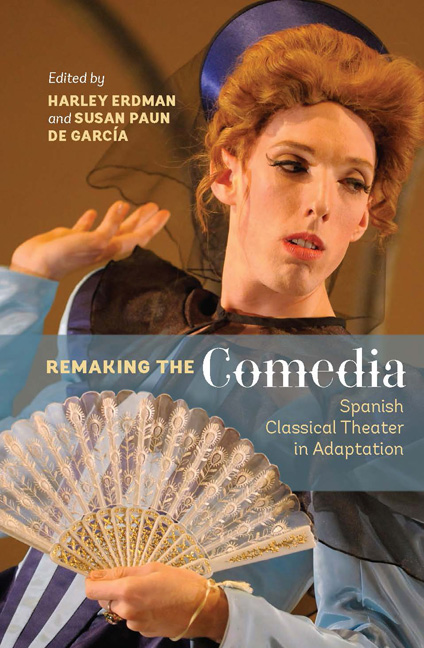Book contents
- Frontmatter
- Contents
- Illustrations
- Contributors
- Preface
- Note to the Reader
- Acknowledgements
- PART I THEORIZING
- PART II SURVEYING
- PART III SPOTLIGHTING
- 11 The Dog in the Manger: The Continuum of Transformation
- 12 El caballero de Olmedo: Los Barracos's Baroque Gentleman
- 13 Corpus Lorqui: Transformation and Transubstantiation in Los Barracos de Federico’s El caballero de Olmedo
- 14 The Phoenix of Madrid: Calderón's No hay burlas con el amor Reborn in Bath
- 15 A Prince in Pittsburgh: “Recasting” a Contemporary Staging of The Constant Prince
- 16 Directing Marta the Divine: Provocative Choices in the Service of the Story
- 17 The Dramaturgy of Absence: Minding the Gaps in Tirso de Molina, Ana Caro, and Feliciana Enríquez
- 18 Translations and Transgressions: Twenty-First-Century Questions Regarding Zayas
- 19 Comedia Actresses, Then and Now: The Case of Ana Caro's Valor, agravio y mujer
- 20 “Kinesthetic Empathy” and the Comedia refundición
- PART IV SHIFTING
- Play Titles Cited
- Works Cited
- Index
12 - El caballero de Olmedo: Los Barracos's Baroque Gentleman
from PART III - SPOTLIGHTING
Published online by Cambridge University Press: 05 December 2015
- Frontmatter
- Contents
- Illustrations
- Contributors
- Preface
- Note to the Reader
- Acknowledgements
- PART I THEORIZING
- PART II SURVEYING
- PART III SPOTLIGHTING
- 11 The Dog in the Manger: The Continuum of Transformation
- 12 El caballero de Olmedo: Los Barracos's Baroque Gentleman
- 13 Corpus Lorqui: Transformation and Transubstantiation in Los Barracos de Federico’s El caballero de Olmedo
- 14 The Phoenix of Madrid: Calderón's No hay burlas con el amor Reborn in Bath
- 15 A Prince in Pittsburgh: “Recasting” a Contemporary Staging of The Constant Prince
- 16 Directing Marta the Divine: Provocative Choices in the Service of the Story
- 17 The Dramaturgy of Absence: Minding the Gaps in Tirso de Molina, Ana Caro, and Feliciana Enríquez
- 18 Translations and Transgressions: Twenty-First-Century Questions Regarding Zayas
- 19 Comedia Actresses, Then and Now: The Case of Ana Caro's Valor, agravio y mujer
- 20 “Kinesthetic Empathy” and the Comedia refundición
- PART IV SHIFTING
- Play Titles Cited
- Works Cited
- Index
Summary
My history with Lorca goes back a long way. He has always captivated me, always given me pleasure, always taken me by surprise, and I have always used him as a reference point for my understanding of theater. And yet never in my thirty long years as a woman of the boards had I had the opportunity to put one of his best-known dramatic texts on its feet (though I've kept it on my night table as my own private bible).
When I turned twelve, my uncle gave me as a gift the Aguilar edition of Lorca's complete works: three tomes of considerable size. All of Lorca was there: his essays, lectures, letters, as well as his poetry and plays. It can't exactly be said that I read it, better to say that I ate it: I devoured it page by page from beginning to end, and it's clear that it has nourished me to the extent that to this day I continue digesting it. I often return to its pages, sometimes to find the keys to my work, other times for the pure pleasure of discovering new sensations and feelings in what I've already read.
In 2006, on the seventieth anniversary of the outbreak of the Spanish Civil War, I finally had the opportunity to solve the mystery behind this story of unconsummated love. I'm referring to the fact that I had never staged a single work by an author I so admired, loved, and worshipped. As luck would have it, a municipality near Madrid commissioned me to adapt and stage a piece of street theater that would evoke the imagined arrival of La Barraca in a town at the time of the Second Republic, in order to put on El caballero de Olmedo. This event would commemorate the end of the Republic and the start of the war that destroyed any possibility of cultural progress in Spain.
It was then that I grasped the message. I had dedicated my entire professional life to the recuperation and realization of classical Spanish theater, and had even founded, in the early 1980s, the company Zampanó-Teatro.
- Type
- Chapter
- Information
- Remaking the ComediaSpanish Classical Theater in Adaptation, pp. 117 - 122Publisher: Boydell & BrewerPrint publication year: 2015



